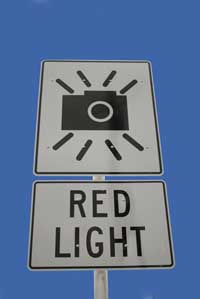Florida Supreme Court rules city governments illegally used red-light cameras

Image from Shutterstock.
Florida’s highest court ruled Thursday that several local governments had acted illegally when they set up video cameras designed to catch motorists who run red lights before the legislature officially approved them.
According to the Tampa Bay Times, these governments—which include several in the Tampa and Orlando areas as well as the city of Aventura, north of Miami— could face thousands of lawsuits from drivers ticketed after being caught on these cameras between their installation and July 1, 2010, when a state law approving their usage took effect statewide.
The state supreme court, in a 5-2 decision (PDF), ruled that these local municipalities did not have the power to enact their own traffic laws, and that by having the cameras prior to July 1, 2010, they were in conflict with state traffic law. Motorists had challenged the Orlando and Aventura cameras in the case. However, the court made clear that any municipality that had red-light cameras installed before July 1, 2010 was in violation of the law. In his majority opinion, Justice Charles Canady held that while municipalities did have the power to regulate traffic matters like movement or parking, they did not have the right to impose discipline for traffic violations. “The Orlando and Aventura ordinances establish a regime for the punishment of red light violations that is distinct from the statutory regime for the punishment of such violations,” Canady wrote.
In her dissent, Justice Barbara Pariente argued that Florida’s home rule authority was broad and gave the municipalities the power to install the cameras.
One thing the court did not do was order any refunds. According to the Tampa Bay Times, individual motorists will have to file suit if they want to get their money back. “There will absolutely have to be litigation filed,” said Luke Lirot, a Clearwater lawyer whose firm represents ticketed drivers, to the Times. “It wouldn’t be a difficult court order to get based on this Supreme Court precedent, but absent a court order, I don’t see any municipality voluntarily giving back a dime of that money.” The Times reports that cameras in Temple Terrace received $1.4 million in fines between October 2008 and November 2009. Cameras in another municipality, Port Richey, generated $1.2 million in fines from May 2008 to December 2010.
Attorney David Kerner, whose firm had originally sued Orlando over its cameras, told the Times that he would seek to file a class-action lawsuit for everyone who was ticketed before July 1, 2010.
Write a letter to the editor, share a story tip or update, or report an error.


